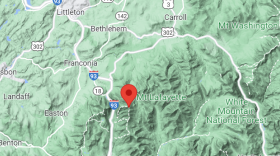House lawmakers will hear a bill Thursday that would make New Hampshire the first state to make people pay fees any time they are rescued by Fish and Game.
Backers of the proposal say they want to help Fish and Game recoup costs of expensive rescue operations.
But opponents, including the state’s volunteer search and rescue outlets, say this bill is a bad idea that could put people, and the state’s appeal to hikers at risk.
Hikers who were in trouble in the White Mountains, exhausted, climbing out a helicopter…
Explaining what went wrong….
“We found a big rock and sleep under it and tried to make a fire but our matches didn’t work and our water froze.”
Overall these are the sounds of a happy ending.
But they are expensive sounds.
Each year Fish and Game conducts about 160 rescues, at a total cost of about $300,000.
That’s roughly $100,000 more than the department’s search and rescue budget.
Major Kevin Jordan of Fish and Game says making up the difference means his department is perpetually scrambling.
“Employees, equipment, training, those sorts of things have to take a secondary role in order to cover these expenses.”
The goal of a bill introduced by Republican Rep. Gene Chandler of Bartlett is to ease this financial crunch.
Right now search-and-rescue is funded by license fees assessed to hunters, fishermen and snowmobilers.
Chandler says it’s high time hikers ponied up too.
“People who are taking advantage, not advantage but using these searches and these rescues should pay for it or help to pay for it.”
Under Chandler’s proposal, anyone who is rescued would pay a fee -- even if the hiker just had the bad luck to slip and break an arm.
Currently, only negligent hikers are charged, and they aren’t charged very often.

The fees Chandler proposes would be on a sliding scale between $350 and $1,000.
Fish and Game license holders would be exempt as would buyers of a proposed $18 safe-hiker card.
The Mountain Rescue Association, which represents 90 search-and-rescue organizations nationwide, has opposed such rescue fees for years.
And within the state there is broad opposition from volunteer search and rescue organizations, who tend to view rescues as public service.
Peter Crane is president of the New Hampshire Outdoor Council.
“I think one aspect of it is looking at backcountry search and rescue the way most communities look at police protection or fire protection.”
And the objections aren’t simply philosophical. Bill Aughton has worked in search and rescue for 35 years. He says making people pay could make rescue situations more dangerous.
‘It hasn’t been proven but there is certainly some fear that people will delay calling for help because they might get a $500 or $1,000 bill.”
Critics also question whether the proposal would raise the money its backers expect.
At an average of 160 searches every year, even if every hiker were charged $600 that would only raise $96,000.
Opponents say the law would cost money to administer. Clerks to process hiker cards, and possibly lawyers to collect delinquent fees.
Bill Kane is a search-and-rescue veteran and director of education at SOLO, which is based in Conway and teaches wilderness emergency medicine.
“The money they raise is so small I’m afraid they could lose money trying to collect it.”
If New Hampshire begins charging rescue fees it would be the only state to do so.
That raises the question of whether the money raised is worth the possibility of irking tourists who spend about $4.3 billion each year in New Hampshire.
Chris Thayer doesn’t think so. He directs North Country Programs and Outreach for the Appalachian Mountain Club.
“Come to our mountains, explore our mountains, go deep into our lakes, explore our snowy hills, but if you slip you are in huge trouble based on this sliding scale and this is what you are going to pay.”
In general the volunteer groups think the money should come from the general fund.
Rep. Gene Chandler, for his part, says he’s isn’t surprised by opponents’ arguments.
“I’ve known about those concerns for some time, I’ve met with some of those groups and understand their position to a point.”
That point, says Chandler is that that the money has to come from somewhere. And hikers are a logical place to start.







